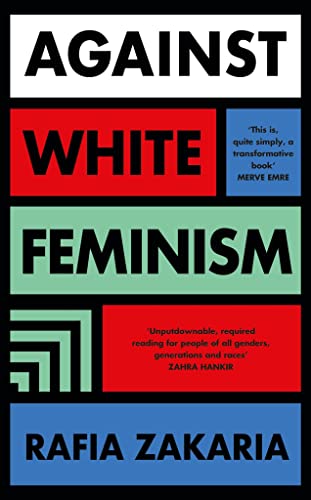Rafia Zakaria – feminism is not only white

Rafia Zakaria has followed a life path that may seem unusual for a U.S. feminist: born and raised in Pakistan, she seized an opportunity to emigrate to the States aged 17 through an arranged marriage.
"One night after dinner, sitting on the edge of my bed in mid-1990s Karachi, I agreed to an arranged marriage," she writes in the opening pages of her book, Against White Feminism. Her motivation? She wanted to go to college. "My life until then had been restricted in all sorts of ways, hardly extending beyond the walls that surrounded our home. I had never experienced freedom, and so I gladly signed it away," she continued.
Zakaria begins her celebrated book with this confession, before recounting how she went on to study law against her husband's wishes. She eventually left him and became an expert in immigration law. But this is background to the main story: how Western feminism is shaped by the dominant priorities of white women.

What is 'white' feminism?
In Rafia Zakaria's life, feminism is not abstract theory, but sheer necessity. If there had been no women's shelters, she might not have been able to leave her husband. If women were still denied access to universities, Zakaria might not have been able to study law.
Contrary to the provocative title, it is a sensitive, delicate, precise observation of the weaknesses of U.S. feminism. But while the book lauds feminism's achievements, Zakaria's personal experiences also reveal its failings in her adopted home.
Zakaria recounts being invited to give a talk on the status of women in Pakistan. On arrival, she learns that she is not to stand on a stage in front of a microphone, but behind a table with printed pictures of rural Pakistani women in traditional dress and a table of small handicrafts – which could be bought from her to raise money for projects abroad.
The organiser was appalled when Zakaria didn't show up in her "traditional" garb like some other Nepal women in attendance. Zakaria says she felt like an animal in a zoo.
Her point is that white, affluent, often university-educated women determine what feminism should be – and its political goals. Black women, on the other hand, should only appear as victims, cowering in women's shelters or toiling in factories. She says that some white feminists cannot conceive that Women of Colour might have different political goals than white women.
Zakaria cites the example of a western NGO encouraging Indian rural women – so they would have more time to seek waged labour outside the home – to use more efficient "clean-cook stoves", which they neither needed nor wanted, in part because they could not repair the stoves locally. Many of the women simply "rejected the notion that the path to empowerment was to make themselves available for wage labour".
What's more, she draws attention to the way white feminists co-opted the war in Afghanistan in the name of feminism in the wake of the 9/11 attacks in 2001. Feminists from the U.S. such as Gloria Steinem and Hollywood actors Susan Sarandon and Meryl Streep signed letters that promised to liberate Afghani women from the Taliban.
"White" feminism – past and present
Zakaria also sheds light on historical cases in her compelling book: as early as the 19th century, British suffragettes demanded that women in colonial India campaign for women's suffrage. When Indian feminists did not comply, white suffragettes wanted to fight for Indian women's suffrage but did not attempt to liberate them from colonial subjugation. "Indian women wanted the vote, but in a country that was no longer under the colonial rule of the British," Zakaria writes. "What power did a vote have in an enslaved country?"
Zakaria's 250-page analysis of white feminism is as precise as it is empathetic. Its consequences, says Rafia Zakaria in interview, can be observed in many places today, including Afghanistan. "The U.S. used feminism as a cover when it invaded Afghanistan, so women's rights in Afghanistan are no longer considered legitimate, but a sign of pro-Western collaborators," she said. "This deeply saddens me." The U.S. knew from the beginning that it would leave the country again, she added, but did nothing to protect women afterwards.
[embed:render:embedded:node:47148]
From rights to political mobilisation
Ciani-Sophia Hoeder, journalist and author of the book "Wut und Böse" (Rage and Evil), published in 2021, says that the feminist movement in Germany is also shaped by the views of white women. She refers to white feminism's "exclusionary criteria" and says she is not drawn to participate in "feminist issues that do not correspond with my everyday life," Hoeder admitted in interview. Questions about women's work almost never refer to the precarious work of migrant women. "German feminism is about bringing white, affluent women forward," she said.
But Rafia Zakaria professes to be hopeful about the future: she believes in the power of feminism. What matters now, she says, is listening to each other and getting involved politically. "It's nice to have rights," said Zakaria. "But we can't keep our rights if we don't organise politically – otherwise our rights will just be taken away again by new governments."
Christine Lehnen
© Deutsche Welle 2022
